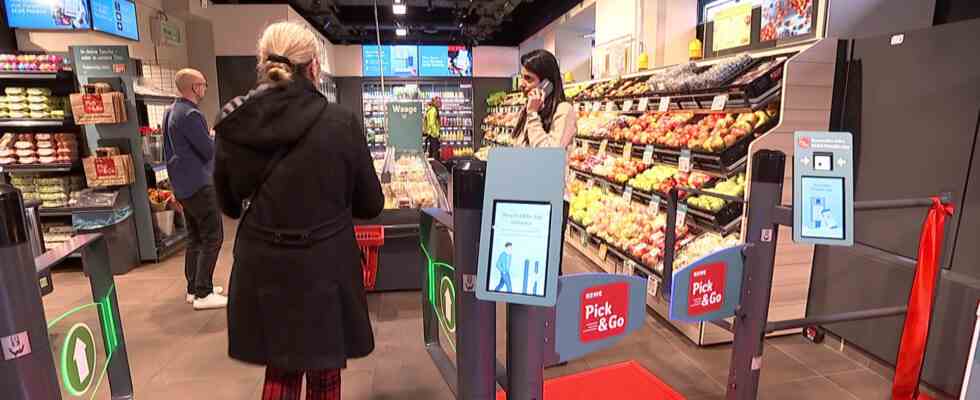Status: 11/19/2022 4:47 p.m
What will the supermarket of the future look like? There are more and more cash registers that you can scan and pay yourself. A large chain is testing a system in which the camera and app do the billing.
Just buy something for dinner and then wait ten minutes at the checkout – that could soon be a thing of the past. In Berlin Prenzlauer Berg, after a first test run in a supermarket in Cologne, the cashless future is being tested. Still in hybrid format: the customer has the choice of waiting at the checkout in the classic way, scanning his goods himself or doing everything via app.
cameras and weight sensors
Simply put everything in your pockets and you’re done – it works with the latest technology. Customers log in via app when entering the Rewe store. Cameras then accompany them through the market. These register what is taken from the shelves, which fruit or vegetables are weighed, how many returnable bottles are handed out. In addition, weight sensors are installed in the shelves, which also register the removal of a product. This is then assigned to the customer.
At the end of the purchase, the bill is sent to the mobile phone, and payment is made by credit card or Google Pay. “Pick and Go” is the name of the system that started a few days ago in Berlin. The previous project in Cologne was much smaller, says Christoph Eltze, CEO of the Rewe Group. “We have four times as many products. We also offer our customers loose goods.”
The customer is recognized in the aisle
Almost 500 cameras were installed in Prenzlauer Berg. The software does the rest. At the entrance, the customer’s gait and stature are scanned and analyzed. From that moment on, it is unique to the software and can be tracked across the market. However, it will not be recognized on the next visit, i.e. the data will not be saved. The system has been coordinated with all data protection authorities, emphasizes Eltze, and the method conforms to the law. There is no face recognition. “So it continues to feel good for the customer,” believes the Rewe Group board.
But he cannot convince many market customers. They lack confidence in technology – or are uncomfortable with the idea of being watched by cameras at every turn. “It dehumanizes the supermarkets,” says one customer.
For Rewe, it is initially a test balloon to see whether customers will accept the offer. The system still has its weaknesses and blind spots. For example, the deli counter does not work without salesperson contact and a receipt. And then there is the question of whether one or the other – without checking in – simply fills their pockets and then leaves the store. So far, “Pick&Go” has not been able to distinguish who is authorized and who is not. “We simply rely on trust in our customers and have additional staff at the front,” says store manager Philipp Schultz.
New ways of trading
Rewe is by no means the only grocer trying out new things. The entire industry is changing. Almost 20 percent of the staff are still needed at the checkout. But the future could do with less. Self-checkouts tripled in Germany between 2015 and 2021.
The numbers are also increasing when people scan the goods themselves using apps or handheld devices. Possibly also due to staff shortages and a lack of skilled workers, the dealers are trying to involve the customer. Advantage for the customer: you no longer have to put anything on the assembly line and the waiting time is shorter. Rewe says that the chain does not want to save on staff, but wants to make better use of it: “We believe that we have an incredible number of positions in the supermarket where we can provide the customer with good service with staff. In advice, in service. ”
The Tegut supermarket now manages entirely without operating and checkout staff – at least in the mini branches called TEO. The company started the project in 2020, there are now 22 stores, and four more are to be added this year. The markets offer a limited range for everyday needs, access to the store is via app or giro card. The company sees this as a “digital corner shop”. In this way, shopping right around the corner should also be possible again in rural areas, 24 hours a day, seven days a week.
Time for a chat at the “Plauderkasse”
The stationary food trade has to make an effort to keep the shops going in the future. What happens if you miss the development can currently be seen in the inner cities. It’s not just about the checkout-free supermarket, says Stephan Genth, Managing Director of the German Retail Association. “It’s also about assortment planning using artificial intelligence, advertising with digital technologies.” According to Genth, the future is a combination of digital and analogue.
The classic shopping with contact to the employees at the checkout should be retained. In Belgium and Switzerland, individual supermarkets are returning to very traditional approaches. So-called “Plauderkassen” offer exactly what makes most customers in the line behind them impatient: time for a chat with the cashier – without pressure. There they want to counteract loneliness.

